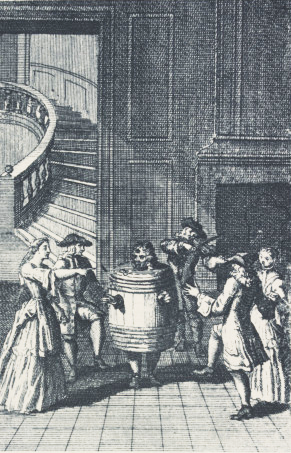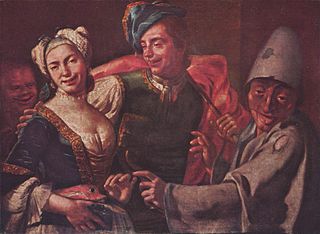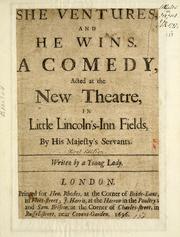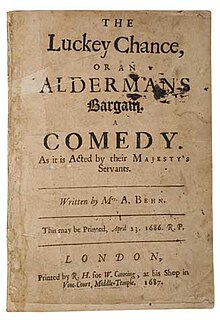
Aphra Behn was an English playwright, poet, prose writer and translator from the Restoration era. As one of the first English women to earn her living by her writing, she broke cultural barriers and served as a literary role model for later generations of women authors. Rising from obscurity, she came to the notice of Charles II, who employed her as a spy in Antwerp. Upon her return to London and a probable brief stay in debtors' prison, she began writing for the stage. She belonged to a coterie of poets and famous libertines such as John Wilmot, Lord Rochester. Behn wrote under the pastoral pseudonym Astrea. During the turbulent political times of the Exclusion Crisis, she wrote an epilogue and prologue that brought her into legal trouble; she thereafter devoted most of her writing to prose genres and translations. A staunch supporter of the Stuart line, Behn declined an invitation from Bishop Burnet to write a welcoming poem to the new king William III. She died shortly after.

"Restoration comedy" is English comedy written and performed in the Restoration period of 1660–1710. Comedy of manners is used as a synonym for this. After public stage performances were banned for 18 years by the Puritan regime, reopening of the theatres in 1660 marked a renaissance of English drama. Sexually explicit language was encouraged by King Charles II (1660–1685) personally and by the rakish style of his court. Historian George Norman Clark argues:
The best-known fact about the Restoration drama is that it is immoral. The dramatists did not criticize the accepted morality about gambling, drink, love, and pleasure generally, or try, like the dramatists of our own time, to work out their own view of character and conduct. What they did was, according to their respective inclinations, to mock at all restraints. Some were gross, others delicately improper.... The dramatists did not merely say anything they liked: they also intended to glory in it and to shock those who did not like it.
This article contains information about the literary events and publications of 1696.
This article contains information about the literary events and publications of 1640.

The Rover or The Banish'd Cavaliers is a play in two parts that is written by the English author Aphra Behn. It is a revision of Thomas Killigrew's play Thomaso, or The Wanderer (1664), and features multiple plot lines, dealing with the amorous adventures of a group of Englishmen and women in Naples at Carnival time. According to Restoration poet John Dryden, it "lacks the manly vitality of Killigrew's play, but shows greater refinement of expression." The play stood for three centuries as "Behn's most popular and most respected play."

Oroonoko: or, the Royal Slave is a work of prose fiction by Aphra Behn (1640–1689), published in 1688 by William Canning and reissued with two other fictions later that year. It was also adapted into a play. The eponymous hero is an African prince from Coramantien who is tricked into slavery and sold to European colonists in Surinam where he meets the narrator. Behn's text is a first-person account of Oroonoko's life, love, rebellion, and execution.
The Wapping Project is a UK London-based arts organisation and a working name of Women's Playhouse Trust (WPT) since 2000. WPT is a registered charity (286384) established in 1981 and incorporated in 1982. The project works as a commissioner and producer of art.
Elizabeth Polewheele, playwright, was one of the first women to write for the professional stage in Restoration London.

The Duke's Company was a theatre company chartered by King Charles II at the start of the Restoration era, 1660. Sir William Davenant was manager of the company under the patronage of Prince James, Duke of York. During that period, theatres began to flourish again after they had been closed from the restrictions throughout the English Civil War and the Interregnum. The Duke's Company existed from 1660 to 1682, when it merged with the King's Company to form the United Company.
Abdelazer; or, The Moor's Revenge is a 1676 play by Aphra Behn, an adaptation of the c. 1600 tragedy Lust's Dominion. It is Behn's only tragic play.
Thomaso, or the Wanderer is mid-seventeenth-century stage play, a two-part comedy written by Thomas Killigrew, The work was composed in Madrid, c. 1654. Thomaso is based on Killigrew's personal experiences as a Royalist exile during the era of the Commonwealth, when he was abroad continuously from 1647 to 1660.
The Emperor of the Moon is a Restoration farce written by Aphra Behn in 1687, based on Italian commedia dell'arte. It was Behn's second most successful play, probably due to the lightness of the plot and its accompanying musical and spectacular entertainment. The music is largely lost today. The play was not fitted out like a big opera, because producers were unwilling to finance a costly opera following the failure of Dryden's Albion and Albanius. The plan was to make audiences come back to the playhouse and attend an affordable mini-spectacle like The Emperor of the Moon.
Derby Playhouse was a theatre production company based in Derby, England and the former name of the theatre which it owned and operated from its opening in 1975 until 2008, when the company ceased operating after a period in administration. The theatre was subsequently reopened in 2009 as the Derby Theatre and is now owned and operated by the University of Derby, where it currently runs its Theatre Arts degree. During its tenure at the theatre, the Derby Playhouse company gained a national reputation for its productions, particularly the works of Stephen Sondheim. It also premiered new theatrical works as well as giving the regional premieres of several others.
The Forc'd Marriage; or, The Jealous Bridegroom is a play by Aphra Behn, staged by the Duke's Company on 20 September 1670 in Lincoln's Inn Fields, London, England. This sex tragicomedy ran for six nights, which granted Behn the house profits for both the third and six nights. It is considered her first staged play. Thomas Otway played a "probation part."
Jules Wright was an Australian-born theatre director, a co-founder in 1981 of the Women's Playhouse Trust (WPT), the first resident woman director at the Royal Court Theatre, being only the second woman to direct on its main stage,

Ariadne was the pseudonym of a "Young Lady" who wrote the play She Ventures and He Wins, which was first performed at The New Theatre in its 1694-95 season. Little is known of her, however she was likely a novice writer who was "keenly aware of theatrical conventions and the politics of the theater". In the preface to her play, Ariadne says that she is not "altogether unacquainted with the Stage". Then, in her prologue, she attacks the owners of a rival theatre, saying that they "out of spite / Trump'd up a Play upon us in a Night", suggesting that she was at least some way involved with the theatre world of 17th century London.
The Town-Fopp: or, Sir Timothy Tawdrey is a Restoration comedy written by Aphra Behn and first staged in 1676. It deals with an unhappy marriage and its dissolution.
The Widdow Ranter, or, the History of Bacon in Virginia is a tragicomic play written by Aphra Behn and first performed posthumously in 1689. It is a highly fictionalized version of Bacon's Rebellion of 1676, and is one of the first plays to be set in British colonial America. It is also the first travel play known to have been written not only by a woman, but by a playwright who had actually traveled to the Americas.
The Younger Brother, or, The Amorous Jilt is a comedy written by Aphra Behn. The play was first performed and published posthumously in 1696, but was probably written in the late 1680s.

Sir Patient Fancy: A Comedy, is a comedic play written by Aphra Behn, first performed in 1678. It is Behn's first overtly political play. It was staged by the Duke's Company at the Dorset Garden Theatre in London with a cast that included Nell Gwyn as Lady Knowell, Anthony Leigh as Sir Patient Fancy, John Crosby as Leander Fancy, Thomas Betterton as Wittmore, William Smith as Lodwick Knowell, James Nokes as Sir Credulous Easy, John Richards as Curry, Elizabeth Currer as Lady Fancy, Mary Betterton as Isabella, Emily Price as Lucretia and Anne Shadwell as Maundy.








